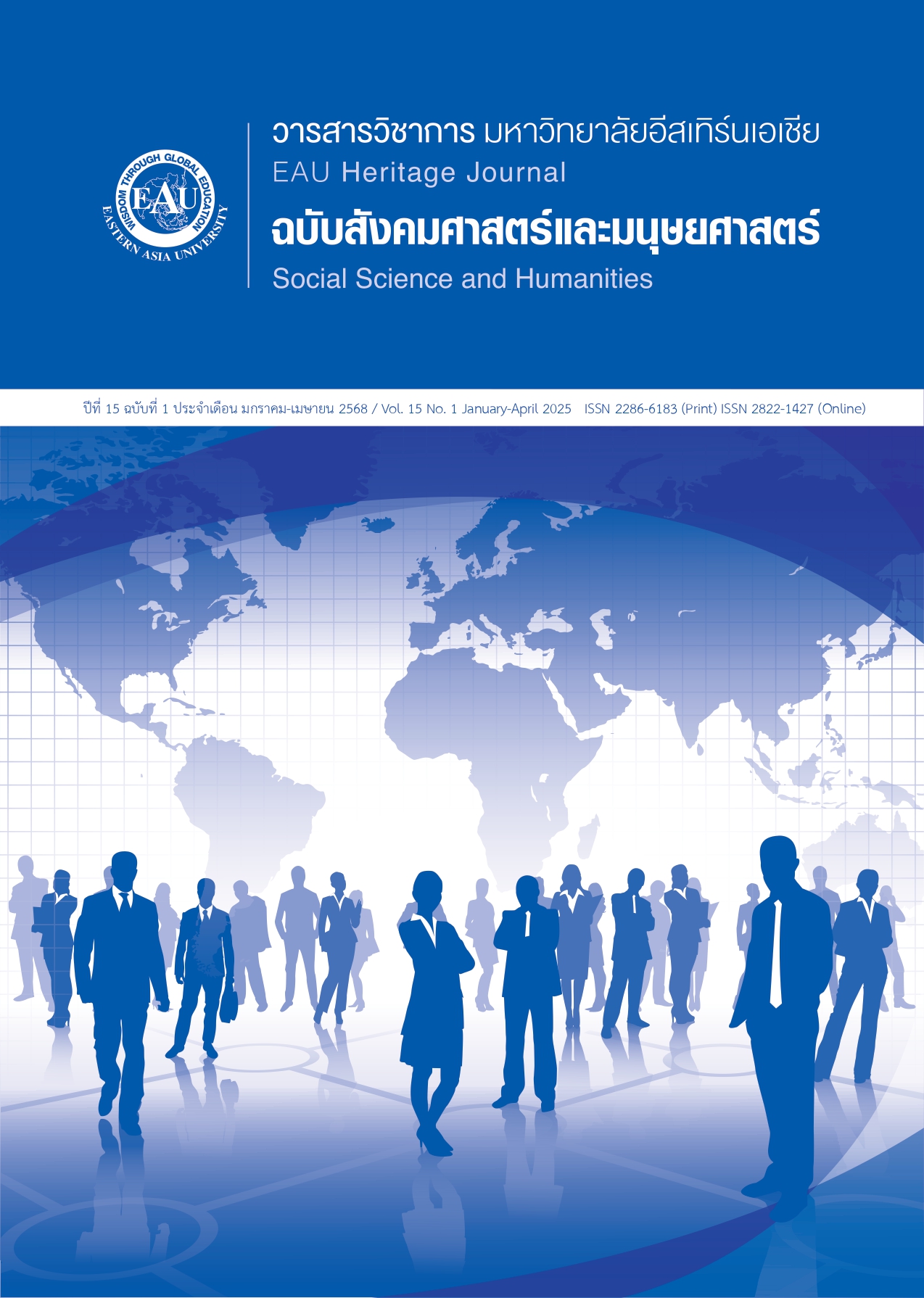The Relationship Between Digital Leadership of School Administrators and Learning Organization Among International Schools in Nonthaburi Province
Keywords:
digital leadership, learning organization, school administratorsAbstract
This research is mixed-method, combining quantitative and qualitative methods research. The objective were to study: (1) the digital leadership of school administrators and the learning organization characteristics of international schools in Nonthaburi Province (2) the relationship between digital leadership of school administrators and the learning organization characteristics of international schools in Nonthaburi Province, and (3) propose guidelines for international schools in Nonthaburi Province to become learning organizations. The study sample consisted of 231 teachers from international schools in Nonthaburi Province, determined through Taro Yamane's formula and qualitative research using semi-structured interviews with 3 school administrators. Data collection instruments included a five-point rating scale questionnaire and interviews. Data were analyzed involved calculating mean, standard deviation, and Pearson's correlation coefficient. The results revealed that (1) the overall level of digital leadership among school administrators and the learning organization characteristics of international schools in Nonthaburi Province were both high, (2) there was a statistically significant positive correlation existed at the .01 level between digital leadership and the learning organization characteristics, and (3) guidelines for cultivating a learning organization culture can be summarized as follows: developing digital skills of administrators, teachers, and staff and efficient technology utilization, promoting ethical and safe technology use, nurturing a continuous learning culture, encouraging analytical thinking, and creating an environment conducive to knowledge sharing.
References
Alexey, M., Gubernatorov, D. V., Galina, T., & Evgeniy, A. U. (2019).
New leadership in digitalization. n.p. doi: 10.1007/978-3-030-69415-9_136
Amnart, P. (2023). Digital leadership of School administrators affecting the effectiveness of
academic affairs administration in Schools under Buengkan Primary educational service
area office. Sakon Nakhon: Sakon Nakhon Rajabhat University. (in Thai)
Artpru, W. (2021). The guidelines for learning organization development of Schools under office
of the non-formal and informal education at central area. Pathum Thani: Rajamangala
University of Technology Thanyaburi. (in Thai)
Avsec, S., Jagiełło-Kowalczyk, M., Żabicka, A., Gawlak, A., & Gil-Mastalerczyk, J. (2023). Leveraging
systems thinking, engagement, and digital competencies to enhance first-year architecture
students’ achievement in design-based learning. Sustainability, 15(20),
doi: https://doi.org/10.3390/su152015115
Chaiyaset, P. (2019). The developing model of digital leadership for a successful digital
transformation. GPH-International journal of business management, 2(08), 1-8. (in Thai)
Chuchuen, R., Tubsree, C., & Suthithatip, S. (2017). Foreign Teachers management system in an
English Program School: A case study at Piboonbumpen Demonstration School Burapha
University, Thailand. HRD journal, 8(2), 80–91. (in Thai)
Evidence for Learning. (2022). Effective professional development. Sydney: Evidence for
Learning.
Gaad, A. L. V. (2022). The effects of online collaborative learning (OCL) on student achievement
and engagement. IAFOR journal of education: Studies in education, 10(3), 31-49.
Intachum, P., Wangcham, S., & Yomsoongnern, J. (2023). The development guidelines of
technology utilization for learning management of Ban Hong Rattana Wittaya School in
Lamphun Orivince. Journal of graduate research, 1(14), 99–112. (in Thai)
Jansuk, J., & Wachrakul, C. (2021). A study of digital leadership components for School
administrators in educational opportunity School Under the Udonthani Primary educational
service area office 3. Sisaket Rajabhat University journal, 15(2), 36-49. (in Thai)
Khitkha, S. (2023). The relationship between digital leadership of administrators and the
effectiveness of general administration in Schools under the secondary educational
service area office Mukdahan. Sakon Nakhon: Sakon Nakhon Rajabhat University. (in Thai)
Kools, M., Stoll, L., George, B., Steijn, B., Bekkers, V., & Gouëdard, P. (2020). The School as a
learning organisation: The concept and its measurement. European journal of education,
(1), 24–42. Doi: https://doi.org/10.1111/ejed.12383
Kudnok, K. (2022). Digital leadership of administrators affecting School effectiveness under
Nakhon Phanom Primary educational service area office 2. Sakon Nakhon: Sakon Nakhon
Rajabhat University. (in Thai)
Laksanadee, R. (2022). Digital leadership of School administrators in Ban Bueng 1 Sub-Campus,
office of Chonburi Primary educational service area. Bangkok: Krirk University (in Thai)
Luecha, C., Chantarasombat, C., & Sirisuthi, C. (2022). Program development of digital
leadership for School administrators under the office of primary educational. n.p.
Magesa, M. M., & Jonathan, J. (2020). Digital leadership for digital transformation
digital leadership for digital transformation. Sokoine University of Agriculture, Tanzania.
Mohebi, L. (2019). Educational leadership and digital culture. Social Science Research Network
(SSRN).
Nellitawati, R., & Hardianto. (2024). The effect of principals’ instructional leadership and
digital literacy on Teachers’ performance. Educational administration: Theory and practice,
(1), 373–381. Doi: https://doi.org/10.53555/kuey.v30i1.1651
Purnomo, E. N., Imron, A., Wiyono, B. B., Sobri, A. Y., & Dami, Z. A. (2024). Transformation of Digital-
Based School culture: Implications of change management on virtual learning environment
integration. Cogent education, 11(1),
Puthaprasert, C., Supising, J., Boonchai, T., Kosanpipat, S., & Poungkaew, P. (2021). Developing
digital literacy skills for administrators under marginalized Schools. Interdisciplinary
research review, 16(5), 1-7.
Rachawong, W. (2019). Leadership in digital educational institutions. Journal of association of
professional development of educational administration of Thailand (JAPDEAT), 1(4), 25-31.
(in Thai)
Ridho, M. R., Lesmana, I., Safitri, H. D., Meirani, R. K., & Prestiadi, D. (2023). Digital leadership in the
scope of education. Proceedings of the international conference on educational
management and technology (ICEMT 2022), 52–61. Doi: https://doi.org/10.2991/978-2-
-95-4_7
Schifter, C. C., Natarajan, U., Ketelhut, D. J., & Kirchgessner, A. (2014). Data-driven decision making:
Facilitating Teacher use of Student data to inform classroom instruction. Contemporary
issues in technology and Teacher education, 14(4),
Senge, P. M. (1990). The fifth discipline: The art & practice of the learning
organization. New York: Doubleday Service Area.
Sheninger, E. (2019). Digital leadership: Changing paradigms for changing times. (2nd ed.). Corwin
Press.
Suksai, P. (2022). The relationship between digital leadership of School administrator and
innovative organization of secondary School in Uttaradit Province. Phitsanulok: Naresuan
University. (in Thai)
Technology Standards for School Administrators Collaborative. (2001). Technology standards for
School administrators. Retrieved from
https://www.iste.org/docs/pdfs/tssa_standards_for_administrators.pdf
Wunnapaka, A. (2023). Digital leadership of administrators affecting the operational effectiveness
of Student assistance system in Schools under the secondary educational service area
office Nakhon Phanom. Sakon Nakhon: Sakon Nakhon Rajabhat University. (in Thai)





